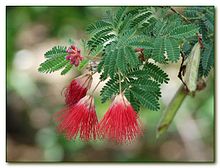| Calliandra californica | |
|---|---|

| |
| Scientific classification | |
| Kingdom: | Plantae |
| Clade: | Tracheophytes |
| Clade: | Angiosperms |
| Clade: | Eudicots |
| Clade: | Rosids |
| Order: | Fabales |
| Family: | Fabaceae |
| Subfamily: | Caesalpinioideae |
| Clade: | Mimosoid clade |
| Genus: | Calliandra |
| Species: | C. californica |
| Binomial name | |
| Calliandra californica Benth. | |
| Synonyms | |
| |
Calliandra californica, the Baja fairy duster, is an evergreen, woody shrub, native to Baja California, Mexico. In Spanish, the plant is also known vernacularly as tabardillo, zapotillo or chuparosa. The flowers, which appear in early summer, have clusters of red stamens. The shrub is usually 0.6–1.8 metres (2 ft 0 in – 5 ft 11 in) in height and has bipinnate leaves. The leaves have been described as "fern-like." Leaves close at night time.
Calliandra californica is cold tolerant to temperatures of 22 °F (−6 °C), though its roots will tolerate temperatures as low as 5 °F (−15 °C). It grows best in full sun. C. californica is very drought tolerant, needing only 10 inches (250 mm) of water every year. However, additional watering will encourage C. californica to bloom through summer and again in the fall.
Propagation of C. californica is done through "acid scarification" or vegetative cutting. Seed pods from this plant look like "snow peas" and when ripe, they explode. The pods are flat and about 2 inches (51 mm) long. After ejecting seeds, the curled open pods remain attached to the plant for some time.
Calliandra californica attracts both bees and hummingbirds.
Along with many other legumes and leadworts (Plumbago), it is a host plant for the Marine Blue caterpillar (Leptotes marina).
In landscaping, it is suggested that C. californica is used in borders or foreground plantings, as an island accent or even in containers.



References
- The Plant List: A Working List of All Plant Species, retrieved 19 June 2016
- "Calliandra californica". Germplasm Resources Information Network. Agricultural Research Service, United States Department of Agriculture. Retrieved 7 May 2015.
- "Calliandra californica". ILDIS. Legume Web. 1 November 2005. Retrieved 7 May 2015.
- ^ Meyer, Chris; Meyer, Trish. "Calliandra californica: Baja Fairy Duster". Wildscaping. Sherman Oaks Garden. Retrieved 4 May 2015.
- ^ "Calliandra californica". Arizona State University. Retrieved 4 May 2015.
- ^ Miller, George Oxford (2008). Landscaping with Native Plants of Southern California. Voyageur Press. p. 91. ISBN 9781616739492.
- "Baja Fairy Duster". Department of Forest Resources and Environmental Conservation. Virginia Tech. Retrieved 4 May 2015.
- "Marine Blue". Butterflies and Moths of North America. Archived from the original on 2007-11-17.
- Rich Bailowitz and Jim Brock. "Southeastern Arizona" (PDF). North American Butterfly Association. Archived from the original (PDF) on 2007-07-12. Retrieved 2008-02-02.
Further reading
- [REDACTED] Media related to Calliandra californica at Wikimedia Commons
| Taxon identifiers | |
|---|---|
| Calliandra californica |
|
This Mimosoideae-related article is a stub. You can help Misplaced Pages by expanding it. |